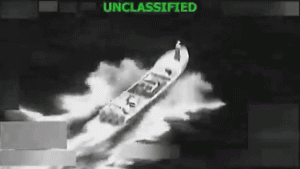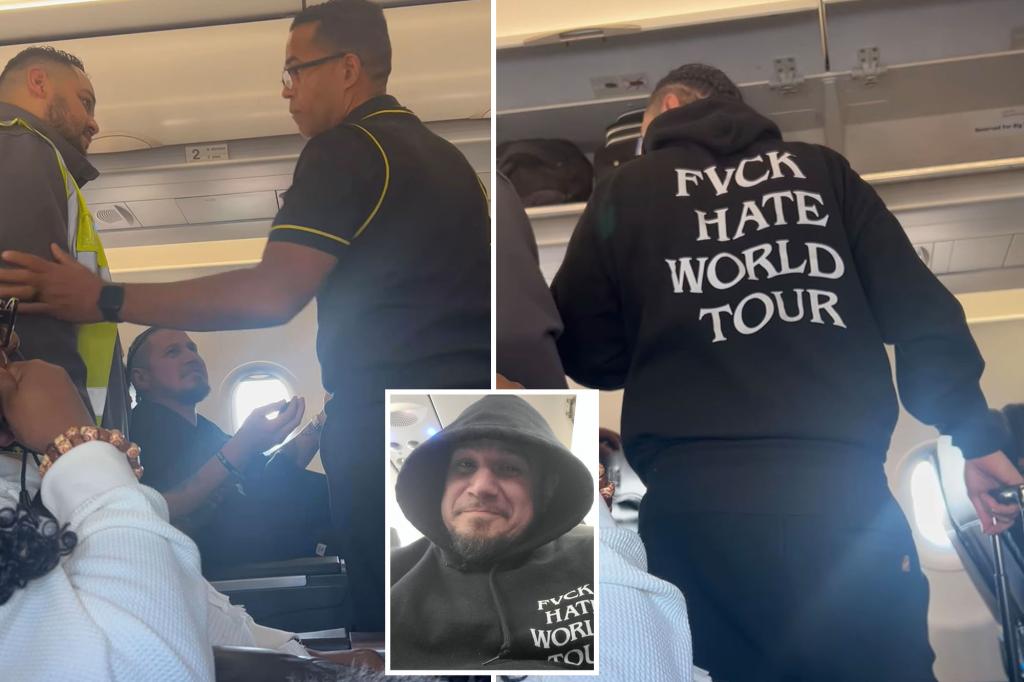Incident Overview and Passenger Perspective:
John Garcia Jr., a 43-year-old Texan, was removed from a Spirit Airlines flight departing from Los Angeles to San Antonio for wearing a hoodie deemed "obscene" by the airline’s staff. The hoodie, purchased from the clothing company FWUH (an acronym for "FVCK WHAT U HEARD!"), displayed the phrase "FVCK HATE WORLD TOUR." Garcia was reportedly in the process of stowing his luggage when a flight attendant questioned him about his seat assignment. After confirming he was in the correct seat, the attendant returned minutes later and instructed him to remove the hoodie, citing its "obscene language." Garcia initially resisted, questioning the basis for the request and whether it violated any specific Spirit Airlines policies. The flight attendant threatened to involve the captain, and subsequently returned with a male colleague, issuing an ultimatum: remove the hoodie or leave the flight.
Garcia inquired about the specific policy violation but was told to accept the crew’s assessment. Spirit Airlines’ contract of carriage does stipulate that passengers can be removed for "lewd, obscene, or offensive" clothing. Faced with the prospect of being denied boarding, Garcia reluctantly removed the hoodie, continuing to question the staff’s rationale. He requested the names of the involved crew members and security personnel before being escorted from the aircraft. The incident, filmed by a fellow passenger and shared on social media, generated widespread attention and sparked a debate about freedom of expression and the interpretation of airline policies.
Public Reaction and Interpretation of the Slogan:
The video of Garcia’s removal, posted in a Facebook group, garnered significant online traction, with viewers largely siding with the passenger. The poster characterized the flight attendant as a "Karen," a pejorative term for an individual perceived as overly assertive and entitled, and argued that the attendant missed the underlying message of the hoodie, which they interpreted as anti-hate. Many commenters expressed outrage, questioning the basis for deeming the hoodie offensive and suggesting that its message was positive. Some urged Garcia to pursue legal action against the airline for what they perceived as a violation of his freedom of expression. The incident ignited a conversation about the appropriateness of the hoodie’s message within the context of air travel and the airline’s right to enforce dress code policies.
The clothing company FWUH, from which Garcia purchased the hoodie, states on its website that it doesn’t promote a specific political viewpoint but aims to use fashion to satirize pop culture, current events, and everyday annoyances, while expressing defiance against perceived societal norms. This context further complicates the interpretation of the hoodie’s message, raising questions about whether the airline’s response was proportionate to the perceived offense.
Spirit Airlines’ Response and Policy Considerations:
Spirit Airlines released a statement acknowledging the incident and confirming that their team is investigating the matter. They reiterated their commitment to ensuring all guests feel welcome and have a positive travel experience. This statement suggests that the airline is taking the incident seriously and is reviewing the circumstances surrounding Garcia’s removal. It remains to be seen whether the airline will revise its policies or provide additional training to its staff regarding the enforcement of dress code regulations.
The incident highlights the delicate balance airlines must strike between maintaining a comfortable and orderly environment for all passengers and respecting individual expression. While airlines have the right to establish and enforce dress codes to prevent disruptive or offensive behavior, the subjective nature of what constitutes "obscene" or "offensive" attire can lead to ambiguous interpretations and potentially discriminatory enforcement.
Analysis of the Incident and Broader Implications:
Garcia’s experience raises several critical questions about the enforcement of airline dress codes. Was the flight attendant’s response proportionate to the perceived offense, considering the hoodie’s arguably anti-hate message? Did the airline adequately consider the context of the slogan before removing Garcia from the flight? The incident underscores the potential for misinterpretation and the need for clear guidelines regarding acceptable attire on flights. It also raises concerns about the potential for selective enforcement based on personal biases or differing interpretations of what constitutes offensive language.
The widespread online discussion surrounding the incident reflects the broader societal debate about freedom of expression and its limits within various contexts. While freedom of speech is a fundamental right, it is not absolute and can be subject to reasonable restrictions, particularly in private settings like an airplane. However, the line between acceptable expression and offensive language can be blurry and open to interpretation, highlighting the need for clear and consistently applied policies.
Legal and Ethical Considerations:
The legal implications of Garcia’s removal from the flight are complex. While airlines have the right to refuse service to passengers who violate their terms of carriage, the enforcement of dress code policies must be reasonable and non-discriminatory. If Garcia believes his removal was unjustified or discriminatory, he may have grounds to pursue legal action against Spirit Airlines. However, the airline could argue that its actions were within its rights to maintain a comfortable and orderly environment for its passengers.
The ethical considerations surrounding this incident are equally complex. Did the flight attendants act ethically in removing Garcia from the flight based on their interpretation of his hoodie’s message? Did they adequately consider the potential impact of their actions on Garcia’s travel plans and emotional well-being? The incident raises questions about the responsibility of airlines to ensure that their policies are applied fairly and consistently, and that their staff are trained to handle such situations with sensitivity and respect.
Moving Forward and Lessons Learned:
The incident involving John Garcia Jr. and Spirit Airlines serves as a valuable case study for airlines, passengers, and the wider public. It highlights the need for clearer communication and understanding regarding airline dress codes, as well as the importance of consistent and non-discriminatory enforcement. Airlines should review their policies to ensure they are specific, unambiguous, and address potential gray areas regarding acceptable attire. Training for flight attendants should emphasize sensitivity, cultural awareness, and the importance of considering the context of potentially offensive language or symbols.
Passengers should also be mindful of airline policies and dress accordingly to avoid potential disruptions or misunderstandings. While freedom of expression is important, it is crucial to respect the rules and regulations established by private entities like airlines. Open dialogue and mutual respect between airlines and passengers are essential to fostering a positive and inclusive travel experience for everyone.















